Yuzheng Zhuang
Learnable Behavior Control: Breaking Atari Human World Records via Sample-Efficient Behavior Selection
May 09, 2023



Abstract:The exploration problem is one of the main challenges in deep reinforcement learning (RL). Recent promising works tried to handle the problem with population-based methods, which collect samples with diverse behaviors derived from a population of different exploratory policies. Adaptive policy selection has been adopted for behavior control. However, the behavior selection space is largely limited by the predefined policy population, which further limits behavior diversity. In this paper, we propose a general framework called Learnable Behavioral Control (LBC) to address the limitation, which a) enables a significantly enlarged behavior selection space via formulating a hybrid behavior mapping from all policies; b) constructs a unified learnable process for behavior selection. We introduce LBC into distributed off-policy actor-critic methods and achieve behavior control via optimizing the selection of the behavior mappings with bandit-based meta-controllers. Our agents have achieved 10077.52% mean human normalized score and surpassed 24 human world records within 1B training frames in the Arcade Learning Environment, which demonstrates our significant state-of-the-art (SOTA) performance without degrading the sample efficiency.
Planning Immediate Landmarks of Targets for Model-Free Skill Transfer across Agents
Dec 18, 2022Abstract:In reinforcement learning applications like robotics, agents usually need to deal with various input/output features when specified with different state/action spaces by their developers or physical restrictions. This indicates unnecessary re-training from scratch and considerable sample inefficiency, especially when agents follow similar solution steps to achieve tasks. In this paper, we aim to transfer similar high-level goal-transition knowledge to alleviate the challenge. Specifically, we propose PILoT, i.e., Planning Immediate Landmarks of Targets. PILoT utilizes the universal decoupled policy optimization to learn a goal-conditioned state planner; then, distills a goal-planner to plan immediate landmarks in a model-free style that can be shared among different agents. In our experiments, we show the power of PILoT on various transferring challenges, including few-shot transferring across action spaces and dynamics, from low-dimensional vector states to image inputs, from simple robot to complicated morphology; and we also illustrate a zero-shot transfer solution from a simple 2D navigation task to the harder Ant-Maze task.
Prototypical context-aware dynamics generalization for high-dimensional model-based reinforcement learning
Nov 23, 2022Abstract:The latent world model provides a promising way to learn policies in a compact latent space for tasks with high-dimensional observations, however, its generalization across diverse environments with unseen dynamics remains challenging. Although the recurrent structure utilized in current advances helps to capture local dynamics, modeling only state transitions without an explicit understanding of environmental context limits the generalization ability of the dynamics model. To address this issue, we propose a Prototypical Context-Aware Dynamics (ProtoCAD) model, which captures the local dynamics by time consistent latent context and enables dynamics generalization in high-dimensional control tasks. ProtoCAD extracts useful contextual information with the help of the prototypes clustered over batch and benefits model-based RL in two folds: 1) It utilizes a temporally consistent prototypical regularizer that encourages the prototype assignments produced for different time parts of the same latent trajectory to be temporally consistent instead of comparing the features; 2) A context representation is designed which combines both the projection embedding of latent states and aggregated prototypes and can significantly improve the dynamics generalization ability. Extensive experiments show that ProtoCAD surpasses existing methods in terms of dynamics generalization. Compared with the recurrent-based model RSSM, ProtoCAD delivers 13.2% and 26.7% better mean and median performance across all dynamics generalization tasks.
NeurIPS 2022 Competition: Driving SMARTS
Nov 14, 2022

Abstract:Driving SMARTS is a regular competition designed to tackle problems caused by the distribution shift in dynamic interaction contexts that are prevalent in real-world autonomous driving (AD). The proposed competition supports methodologically diverse solutions, such as reinforcement learning (RL) and offline learning methods, trained on a combination of naturalistic AD data and open-source simulation platform SMARTS. The two-track structure allows focusing on different aspects of the distribution shift. Track 1 is open to any method and will give ML researchers with different backgrounds an opportunity to solve a real-world autonomous driving challenge. Track 2 is designed for strictly offline learning methods. Therefore, direct comparisons can be made between different methods with the aim to identify new promising research directions. The proposed setup consists of 1) realistic traffic generated using real-world data and micro simulators to ensure fidelity of the scenarios, 2) framework accommodating diverse methods for solving the problem, and 3) baseline method. As such it provides a unique opportunity for the principled investigation into various aspects of autonomous vehicle deployment.
RITA: Boost Autonomous Driving Simulators with Realistic Interactive Traffic Flow
Nov 11, 2022



Abstract:High-quality traffic flow generation is the core module in building simulators for autonomous driving. However, the majority of available simulators are incapable of replicating traffic patterns that accurately reflect the various features of real-world data while also simulating human-like reactive responses to the tested autopilot driving strategies. Taking one step forward to addressing such a problem, we propose Realistic Interactive TrAffic flow (RITA) as an integrated component of existing driving simulators to provide high-quality traffic flow for the evaluation and optimization of the tested driving strategies. RITA is developed with fidelity, diversity, and controllability in consideration, and consists of two core modules called RITABackend and RITAKit. RITABackend is built to support vehicle-wise control and provide traffic generation models from real-world datasets, while RITAKit is developed with easy-to-use interfaces for controllable traffic generation via RITABackend. We demonstrate RITA's capacity to create diversified and high-fidelity traffic simulations in several highly interactive highway scenarios. The experimental findings demonstrate that our produced RITA traffic flows meet all three design goals, hence enhancing the completeness of driving strategy evaluation. Moreover, we showcase the possibility for further improvement of baseline strategies through online fine-tuning with RITA traffic flows.
Decomposed Mutual Information Optimization for Generalized Context in Meta-Reinforcement Learning
Oct 09, 2022
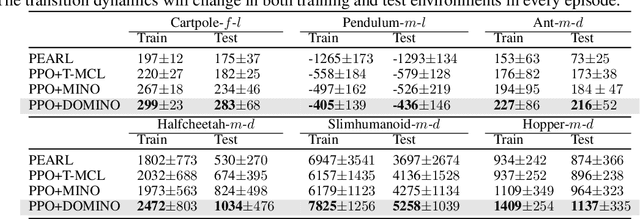
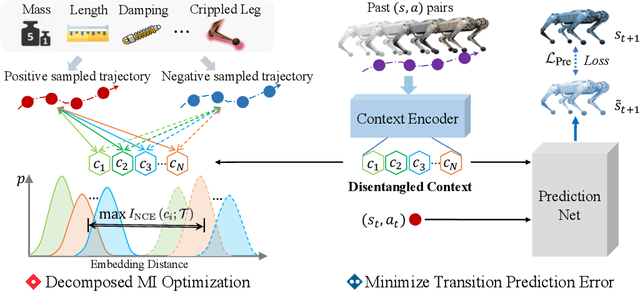
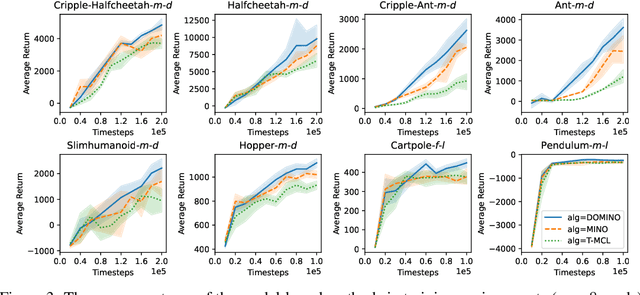
Abstract:Adapting to the changes in transition dynamics is essential in robotic applications. By learning a conditional policy with a compact context, context-aware meta-reinforcement learning provides a flexible way to adjust behavior according to dynamics changes. However, in real-world applications, the agent may encounter complex dynamics changes. Multiple confounders can influence the transition dynamics, making it challenging to infer accurate context for decision-making. This paper addresses such a challenge by Decomposed Mutual INformation Optimization (DOMINO) for context learning, which explicitly learns a disentangled context to maximize the mutual information between the context and historical trajectories, while minimizing the state transition prediction error. Our theoretical analysis shows that DOMINO can overcome the underestimation of the mutual information caused by multi-confounded challenges via learning disentangled context and reduce the demand for the number of samples collected in various environments. Extensive experiments show that the context learned by DOMINO benefits both model-based and model-free reinforcement learning algorithms for dynamics generalization in terms of sample efficiency and performance in unseen environments.
Plan Your Target and Learn Your Skills: Transferable State-Only Imitation Learning via Decoupled Policy Optimization
Mar 04, 2022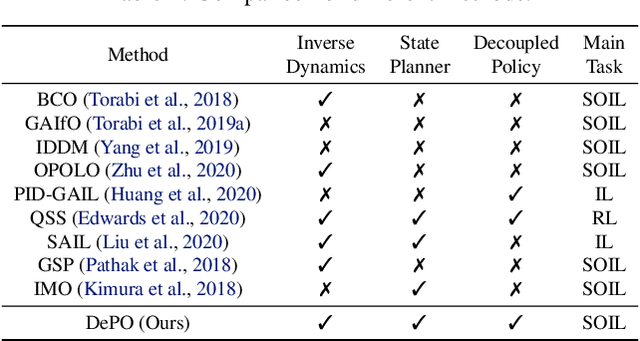
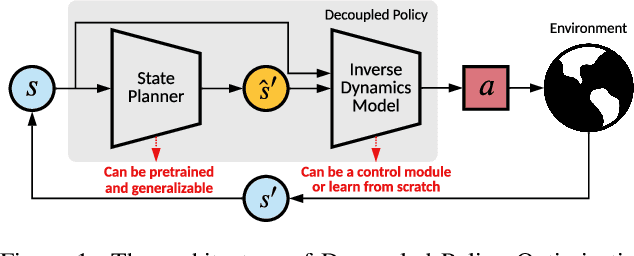

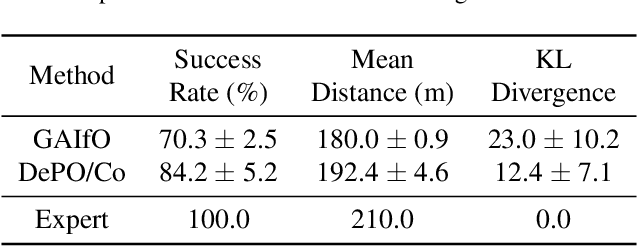
Abstract:Recent progress in state-only imitation learning extends the scope of applicability of imitation learning to real-world settings by relieving the need for observing expert actions. However, existing solutions only learn to extract a state-to-action mapping policy from the data, without considering how the expert plans to the target. This hinders the ability to leverage demonstrations and limits the flexibility of the policy. In this paper, we introduce Decoupled Policy Optimization (DePO), which explicitly decouples the policy as a high-level state planner and an inverse dynamics model. With embedded decoupled policy gradient and generative adversarial training, DePO enables knowledge transfer to different action spaces or state transition dynamics, and can generalize the planner to out-of-demonstration state regions. Our in-depth experimental analysis shows the effectiveness of DePO on learning a generalized target state planner while achieving the best imitation performance. We demonstrate the appealing usage of DePO for transferring across different tasks by pre-training, and the potential for co-training agents with various skills.
Reinforcement Learning based Negotiation-aware Motion Planning of Autonomous Vehicles
Jul 08, 2021

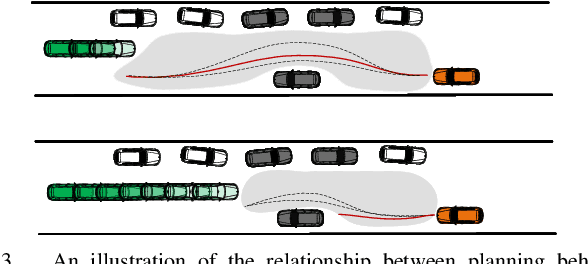

Abstract:For autonomous vehicles integrating onto roadways with human traffic participants, it requires understanding and adapting to the participants' intention and driving styles by responding in predictable ways without explicit communication. This paper proposes a reinforcement learning based negotiation-aware motion planning framework, which adopts RL to adjust the driving style of the planner by dynamically modifying the prediction horizon length of the motion planner in real time adaptively w.r.t the event of a change in environment, typically triggered by traffic participants' switch of intents with different driving styles. The framework models the interaction between the autonomous vehicle and other traffic participants as a Markov Decision Process. A temporal sequence of occupancy grid maps are taken as inputs for RL module to embed an implicit intention reasoning. Curriculum learning is employed to enhance the training efficiency and the robustness of the algorithm. We applied our method to narrow lane navigation in both simulation and real world to demonstrate that the proposed method outperforms the common alternative due to its advantage in alleviating the social dilemma problem with proper negotiation skills.
Learning Symbolic Rules for Interpretable Deep Reinforcement Learning
Mar 16, 2021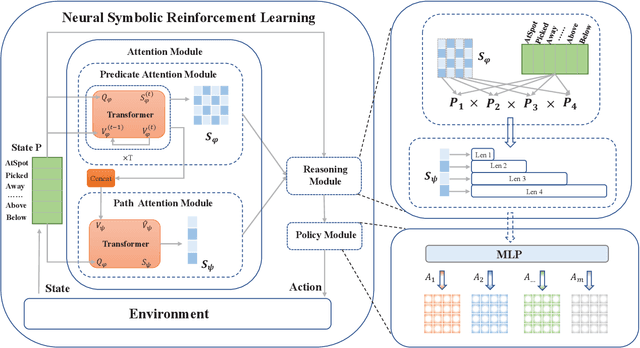


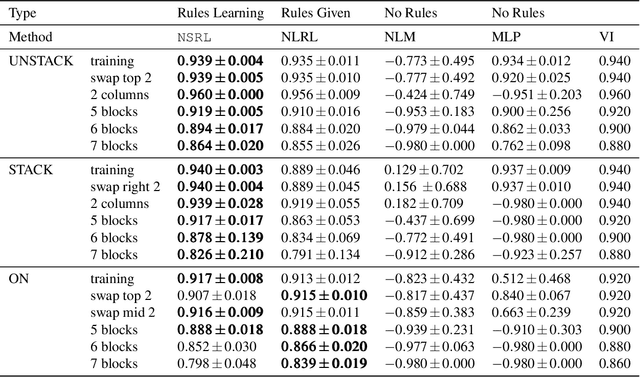
Abstract:Recent progress in deep reinforcement learning (DRL) can be largely attributed to the use of neural networks. However, this black-box approach fails to explain the learned policy in a human understandable way. To address this challenge and improve the transparency, we propose a Neural Symbolic Reinforcement Learning framework by introducing symbolic logic into DRL. This framework features a fertilization of reasoning and learning modules, enabling end-to-end learning with prior symbolic knowledge. Moreover, interpretability is achieved by extracting the logical rules learned by the reasoning module in a symbolic rule space. The experimental results show that our framework has better interpretability, along with competing performance in comparison to state-of-the-art approaches.
Triple-GAIL: A Multi-Modal Imitation Learning Framework with Generative Adversarial Nets
May 22, 2020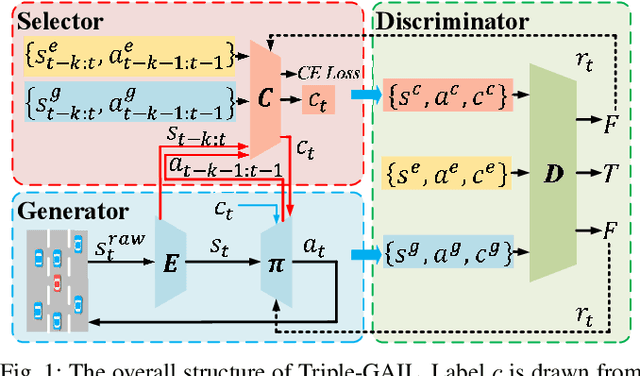
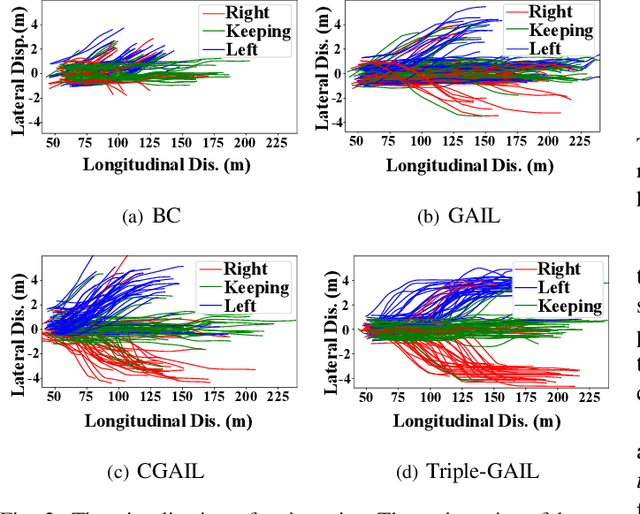


Abstract:Generative adversarial imitation learning (GAIL) has shown promising results by taking advantage of generative adversarial nets, especially in the field of robot learning. However, the requirement of isolated single modal demonstrations limits the scalability of the approach to real world scenarios such as autonomous vehicles' demand for a proper understanding of human drivers' behavior. In this paper, we propose a novel multi-modal GAIL framework, named Triple-GAIL, that is able to learn skill selection and imitation jointly from both expert demonstrations and continuously generated experiences with data augmentation purpose by introducing an auxiliary skill selector. We provide theoretical guarantees on the convergence to optima for both of the generator and the selector respectively. Experiments on real driver trajectories and real-time strategy game datasets demonstrate that Triple-GAIL can better fit multi-modal behaviors close to the demonstrators and outperforms state-of-the-art methods.
 Add to Chrome
Add to Chrome Add to Firefox
Add to Firefox Add to Edge
Add to Edge